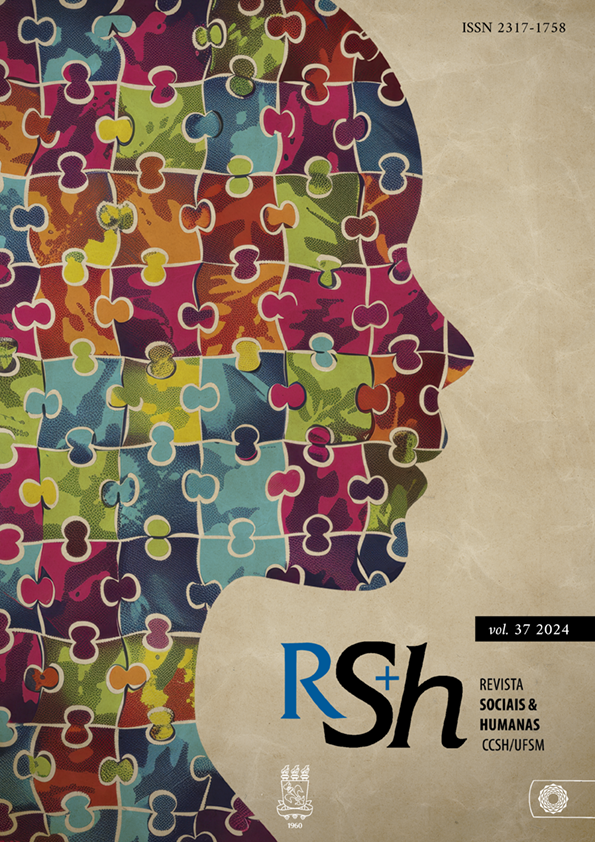Digital technology, complex paradigm and (dis)information society
DOI:
https://doi.org/10.5902/2317175884062Keywords:
Disinformation, Complex Thinking, Extremism, Technology, FreedomAbstract
This article proposes to reflect on the role of technological mediations in the performance of extremisms that inhabit digital communication networks. Based on a bibliographical review and founded on Edgar Morin's paradigm of complicity, a hypothesis under discussion here considers that extremist movements and the phenomenon of disinformation do not result only from the abusive use of technology, which has mobilized regulatory meanings. It turns out that digital communication platforms structurally reproduce the conditions from which they were (and are) developed, conditions marked by values that alienate knowledge, information and subjects, producing extremism and disinformation.
Downloads
References
AGÊNCIA O Globo. É o fim da Lei de Moore? Inteligência artificial como a do ChatGPT desafia limites. PEGN Tecnologia, 8 fev. 2023. Disponível em: https://revistapegn.globo.com/tecnologia/noticia/2023/02/e-o-fim-da-lei-de-moore-inteligencia-artificial-como-a-do-chatgpt-desafia-limites.ghtml Acesso em: 8 jun. 2023.
BACHELARD, Gaston. O novo espírito científico. Lisboa: Edições 70, 1996.
BATTISTI, César Augusto A natureza do mecanicismo cartesiano. Peri, v. 2, n. 2, 13 out. 2010. Disponível em: https://ojs.sites.ufsc.br/index.php/peri/article/view/833 Acesso em: 20 nov. 2022.
BAUMAN, Zygmunt. A sociedade individualizada: vidas contadas e histórias vividas. Tradução José Gradel. Rio de Janeiro: Zahar, 2008.
BERGER, Peter L.; LUCKMANN, Thomas. A construção social da realidade. 36. ed. Tradução Floriano de Souza Fernandes. Petrópolis: Vozes, 2014.
BEZERRA, Benilton. O valor das diferenças em um mundo compartilhado: diversidade humana. Café Filosófico, Instituto CPFL, 2015. Disponível em: https://institutocpfl.org.br/play/diversidade-humana-com-benilton-bezerra-jr-versao-tv-cultura/. Acesso em: 16 ago. 2022.
BRASIL. Senado Federal. Projeto de Lei n° 2630, de 2020. Institui a Lei Brasileira de Liberdade, Responsabilidade e Transparência na Internet. Disponível em: https://www25.senado.leg.br/web/atividade/materias/-/materia/141944 Acesso em: 20 abr. 2023.
BRIGGS, Asa; BURKE, Peter. Uma história social da mídia: de Gutenberg à Internet. 3. Ed. Tradução Maria Carmelita Pádua Dias. Rio de Janeiro: Zahar, 2016.
CASANOVA, Pablo González. As novas ciências e as humanidades: da academia à política. Tradução Mouzar Benedito. São Paulo: Boitempo, 2006.
CASTELLS, Manuel. O poder da comunicação. 2. ed. Tradução Vera Lúcia Mello Joscelyne. Rio de Janeiro: Paz&Terra, 2017.
DESCARTES, René. Discurso do método. São Paulo: Martins Fontes, 1996.
ECHEVERRÍA, Rafael. Ontología del Lenguaje. 6 ed. Chile: J. C. Sáez, 2003.
KANT, Immanuel. Fundamentação da metafísica dos costumes. Tradução de Paulo Quintela. Lisboa: Edições 70, 2007
LANIER, Jaron. Bem vindo ao futuro: uma visão humanística sobre o avanço da tecnologia. São Paulo: Saraiva, 2012.
LÉVY, Pierre. Cibercultura. Tradução Carlos Irineu da Costa. São Paulo: Editora 34, 1999.
MAEDA, John. As leis da simplicidade: vida, negócios, tecnologia, design. Tradução Fernando Lopes Dantas. Ribeiro Preto: Novo Conceito, 2006.
MCLUHAN, Marshall. Understanding media: the extensions of man. Berkeley: Gingko Press, 2013.
MORIN, Edgar. As grandes questões do nosso tempo. 2. ed. Tradução Adelino dos Santos Rodrigues. Lisboa: Editorial Notícias, 1981.
MORIN, Edgar. Ciência com consciência. 8. ed. Tradução Maria D. Alexandre e Maria Alice Sampaio Dória. Rio de Janeiro: Bertrand Brasil, 2005.
MORIN, Edgar. Da necessidade de um pensamento complexo. In: MARTINS, Francisco Menezes; SILVA, Juremir Machado (Orgs.). Para navegar no século XXI: tecnologias do imaginário e cibercultura. 2. ed. Porto Alegre: Editora Sulina, 2000, p. 19-42.
MORIN, Edgar. Introdução ao pensamento complexo. 4. ed. Tradução Eliane Lisboa. Porto Alegre: Sulina, 2011.
MOSÉ, Viviane. O homem que sabe. Rio de Janeiro: Civilização Brasileira, 2014.
ORLANDI, Eni Pulcinelli. Análise de discurso: princípios e procedimentos. 12. ed. Campinas: Pontes Editores, 2015.
SHANNON, Claude Elwood. A Mathematical Theory of Communication. The Bell System Technical Journal, v. 27, p. 379–423, 623–656, jul./out. 1948. Disponível em: https://people.math.harvard.edu/~ctm/home/text/others/shannon/entropy/entropy.pdf Acesso em: 20 abr. 2022.
SHANNON, Claude Elwood. Communication Theory of Secrecy Systems. The Bell System Technical Journal, v. 28, n. 4, oct. 1949. Disponível em: https://doi.org/10.1002/j.1538-7305.1949.tb00928.x Acesso em: 20 abr. 2022.
SHANNON, Claude Elwood. Programming a Computer for Playing Chess. Philosophical Magazine, v. 41, n. 314, mar. 1950. Disponível em: https://vision.unipv.it/IA1/ProgrammingaComputerforPlayingChess.pdf Acesso em: 20 abr. 2022.
SONI, Jimmy; GOODMAN, Rob. A mind at play: how Claude Shannon invented the information age. Nova York: Simon & Schuster, 2018.
UCTV. University of California Television. Claude Shannon - Father of the Information Age. 2008. Disponível em: https://youtu.be/z2Whj_nL-x8 Acesso em: 20 abr. 2022.
VIEIRA PINTO, Álvaro. O conceito de tecnologia. Rio de Janeiro: Contraponto, 2005, v. I.
Downloads
Published
How to Cite
Issue
Section
License
Copyright (c) 2024 Revista Sociais e Humanas

This work is licensed under a Creative Commons Attribution-NonCommercial-ShareAlike 4.0 International License.
Os direitos autorais para artigos publicados nesta revista são do autor, com direitos de primeira publicação para a revista. Em virtude de aparecerem nesta revista de acesso público, os artigos são de uso gratuito, com atribuições próprias, em aplicações educacionais e não-comerciais. A revista permitirá o uso dos trabalhos publicados para fins não-comerciais, incluindo direito de enviar o trabalho para bases de dados de acesso público. Os artigos publicados são de total e exclusiva responsabilidade dos autores.


